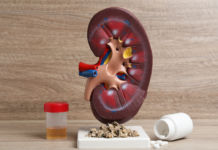Halloween is right around the corner, which means one thing: candy! It’s often challenging to resist Halloween candy temptations, so we’ve compiled some tips and tricks for you to treat your body in a safe way.
While living with chronic kidney disease (CKD), it’s important to know which foods are kidney friendly and which foods to avoid especially if you are on a dialysis diet. It’s okay to have a sweet tooth, however, moderation is a must.
According to DaVita, the following list of candies are O-KAY to treat your kidneys to:1
Hard Candy
- Jolly Ranchers, Sweet Tarts, Lemonheads, sugar-free hard candies, Life Savers, Lollipops, Smarties, Candy Canes, Mike‘n’Ikes, Jawbreakers, Werther’s
Gummy Candy
- Gummy Bears/Worms, Jelly Beans, Dots, Sour Patch Kids, Jujyfruit, Peach Rings, Fruit Slices
Marshmallow Candy
- Peeps marshmallows
Chocolate Covered Candy
- York Peppermint Patty, Junior Mints, Three Musketeers
Chewy Candy Starburst, Skittles, Laffy Taffy, Air Heads, Candy Corn, Tootsie Rolls
Tips & Tricks: Avoid candies that are high in phosphorus and potassium.
Some examples of candy to AVOID include:
This includes chocolate candy, candy with nuts, candy with dried fruit, peanut butter, caramel, coconut and certain chocolate covered candies.1
Chocolate Bars/Chocolate with Nuts
- Milk, Dark Chocolate or White Chocolate – Hershey’s, Cadbury, Heath Bar, Kit Kat, Nestle Bars, Rolo’s
- Chocolate with Nuts – Snickers, Peanut M&M’s, Hershey Bar with Almonds, Mounds, Baby Ruth
Candy with Nuts
- Pay Day
Candy with Peanut Butter
- Reece’s Peanut Butter Cup, Reece’s Pieces
Candy with Dried Fruit
- Raisinets, Raisins
It’s important to monitor your phosphorus and potassium intake while living with chronic kidney disease. A buildup of phosphorus can be damaging to your heart and bones.2 If the kidneys cannot filter out phosphorus, it leads to a calcium deficit in your bones. This can also cause calcium deposits in the heart, lung, blood vessels and eyes. Overtime, this may lead to a stroke or a heart attack.3
Potassium helps your body maintain a regular heartbeat and keeps the muscles functioning correctly. Having a high potassium intake may increase your risk of having a potential heart attack or irregular heartbeat.4 A buildup of potassium may also cause weakness or tiredness.
Remember to always speak with your Primary Care Physician and/or dietitian first to see what the best diet plan for you may be.
We WITCH you a safe and happy Halloween!
Sponsor: Kibow Biotech® 
References
- “Kidney-Friendly Candy for Dialysis Patients.” DaVita, www.davita.com/diet-nutrition/articles/advice/kidney-friendly-candy-for-dialysis-patients.
- “PotassiumFoods, Phosphorus Foods and the Dialysis Diet.” DaVita,www.davita.com/diet-nutrition/articles/basics/potassium-phosphorus-and-the-dialysis-diet.
- “Phosphorus and Your CKD Diet.” National Kidney Foundation, 30 Aug. 2019,www.kidney.org/atoz/content/phosphorus.
- “Potassium and Your CKD Diet.” National Kidney Foundation, 2 Nov. 2018, www.kidney.org/atoz/content/potassium.




